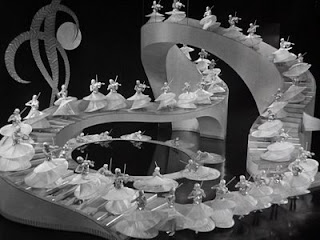
No, I'm not talking about the latest episode of "The Real Housewives," "Gold Diggers of 1933" is a Warner Bros. musical from, appropriately enough, 1933. It's black-and-white and stars Dick Powell, Ruby Keeler, and Ginger Rogers. The real draw though is that it was choreographed by Busby Berkeley, the king of 1930s musicals.
I have to admit that my renting this film was not entirely a pure act by a film graduate who wanted to refresh her knowledge of pre-code production. No, it was partially a sense of guilt that made me move this one to the top of my Netflix queue. You see, I have to mix up my films to balance out the cheesier, just-for-fun titles with more serious, or sometimes, just older fare. Being that my previous rental choice had been "The House Bunny" I felt a real need to rent something with a little more, er, um substance.
"Gold Diggers," whose title makes me think of "Gold Diggers: The Secret of Bear Mountain," starring my now-and-forever idol Christina Ricci, is a backstage musical. It's a show-within-a-show. It's, well, pretty much "42nd Street: Revisited." It was greenlit after the success of "42nd Street," also made at Warner Bros. and also starring much of the same cast. You see, you can't complain that "They don't make 'em like they used to" when you hear that "Halloween 15" is coming out because capitalizing on financial success by using familiar formulas has been Hollywood's game the whole time.
The film opens with the number "We're in the Money," which, in these "troubled economic times" might make you want to drive a blunt object through your eye. However, we soon realize that the film is set in 1933; in the middle of the Depression and that our stars are no more in the money than we are. This timing makes for an interesting viewing relationship.
We follow three heroines: Carol, Polly, and Trixie. You know what this means - I've got my names picked out for those triplets I'm going to have one day! These women are chorus girls on Broadway, but financial woes have prevented their last couple of shows from ever opening so now they're poor and sad. Poorness and sadness aside, they seem to live in a pretty nice apartment, as much as the film tries to convince me it's the slums. So it seems that the Hollywood theme of film and television characters living comfortably, far beyond their means, can be dated back to at least the '30s. Monica Geller, I'm looking at you.
Our girl Polly has been hooking up with a poor songwriter, Brad, played by Dick Powell, whose actions throughout the film make him the opposite of his first name. A play producer pitches an idea for a new show and hires the girls to star in it and Brad to write the music. From this point, that storyline is pretty much good to go. There is a secondary storyline, however, that pops up.
We find out that Brad may be a bit wealthier than he has let on. Some of his male family members disapprove when they find out about Polly and try to convince her that she cannot marry Brad. Because of a case of mistaken identity, Carol and Trixie end up fooling the two men who come to stop the marriage. What begins as a prank results in the girls wooing these two men, with Carol actually falling in love and Trixie very clearly just using her man, and pretty much getting whatever they ask for in either actions or material goods.
They are the gold diggers. At the end of the film, I started wondering whether to consider these women feminists or the complete opposite and I actually leaned toward the feminist side. These women are talented actresses with the ability to survive on their own with their work. When the two men come into the picture, however, they see an opportunity for more wealth. They use their intelligence and sexuality to get whatever they want; putting them in charge of the relationship; giving them the power. They don't need these men; they're just fun to have. As a side note, the girls from this 1930s film are actually much more feminist than the girls in "The House Bunny" (2008) which might make you think, or it might not.
The best parts of this movie are the musical numbers choreographed by Berkeley. They are grand in scope, creative, and executed perfectly. They begin as if they are actually being staged in the theater and then they turn into a dream world that could never fit inside a theater. They are the reason to watch this film. The numbers are of course just as good in the better-known "42nd Street" so that might be the movie to see instead. Unless of course you sense that you will, someday soon, find yourself amongst pretentious film majors. Then you must choose "Gold Diggers" or you will be accused of being too mainstream. The horror.

No comments:
Post a Comment